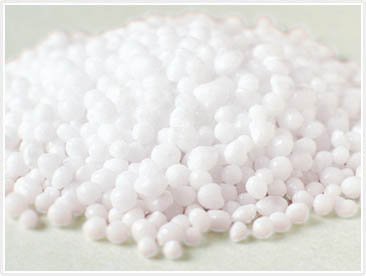
Ammonium sulfate synthetic (sulfur-ammonium) (NH4) 2SO4– nitrogen-sulfur fertilizer. Ammonium sulfate contains 21% nitrogen and 24% sulfur. It is chemically neutral crystalline white salt, well soluble in water. Hygroscopicity of its poor, so long-term storage does not cake and preserves the free flowing. The value of nitrogen in plant life cannot be overestimated – it ranks first among the mineral compounds, and therefore dwell on the significance of sulfur of sulfur in plant life. Sulfur – is one of the main elements of the crops, like nitrogen, it enters into the composition of proteins and amino acids. On the physiological role of sulfur in plant nutrition, should be put in third place after the nitrogen and phosphorus.
A considerable part of sulfur in plants is in the form of salts of sulfuric acid, ammonium sulphate is an excellent source of sulfur nutrition. Ammonium, which enters into ammonium sulfate, is easily accessible to plants, small agile is not washed from the soil, allowing for its wide application as basic fertilizer, as well as spring fertilizing.
Low sulfur content in the soil can be a significant factor limiting the effectiveness of the use of nitrogen, phosphate and potash fertilizers.
Compared with other crops a large amount of sulfur consumes the rape. Particularly good results cause the ammonium sulphate under corn, potatoes and vegetables, including sugar beet.
Most of the households receive tangible gain productivity and quality, but few manage to achieve the maximum protein content in wheat grain.
Agronomists-practitioner and economists need to remember that when using ammonium sulfate at the same time eliminated the lack of nitrogen and sulfur in plant nutrition, that greatly improves the quality of cultivated products.
On chernozem a positive effect of ammonium sulphate on the crops yield in some cases, even superior to other forms of nitrogen fertilizers. Considering also the fact, that the retail price of ammonium sulphate is much lower ammonium nitrate and the more urea, the advantage of cost-effectiveness of ammonium sulfate is obviously.
Of all existing forms of sulfur fertilizers, the highest content of sulfur has ammonium sulfate synthetic. That is why; in the near future the most realistic way of replenishment of sulfur in soils is the use of this particular fertilizer.
Ammonium sulfate.
Terms, doses and methods of application.
Ammonium sulfate is a highly effective nitrogen fertilizer, application of which provides high agronomic and economic efficiency of cultivation of major crops.
Ammonium sulfate is primarily recommended for the following crops:
- demanding to sulfur (rape, cabbage and other crucifers, buckwheat, winter and spring wheat);
- prefer ammonium nitrate to nitrogen (potatoes, sugar beets, fodder crops);
- better to grow at slightly acid reaction of soil solution (potatoes, flax, tea, sunflower seeds, carrots, tomatoes, sorrel, parsley, turnip, radish, pumpkin, zucchini, radishes, gooseberries, raspberries).
To make the ammonium sulfate is better in spring in the main application of presowing cultivation, which allows even distribution of fertilizer in the field. Fertilizing crops with ammonium sulfate are also effective. In this case, carefully work on adjusting the machine for fertilizer, as well as directly during feedings. Furthermore, ammonium sulfate can be added to a solution of liquid nitrogen fertilizers.
